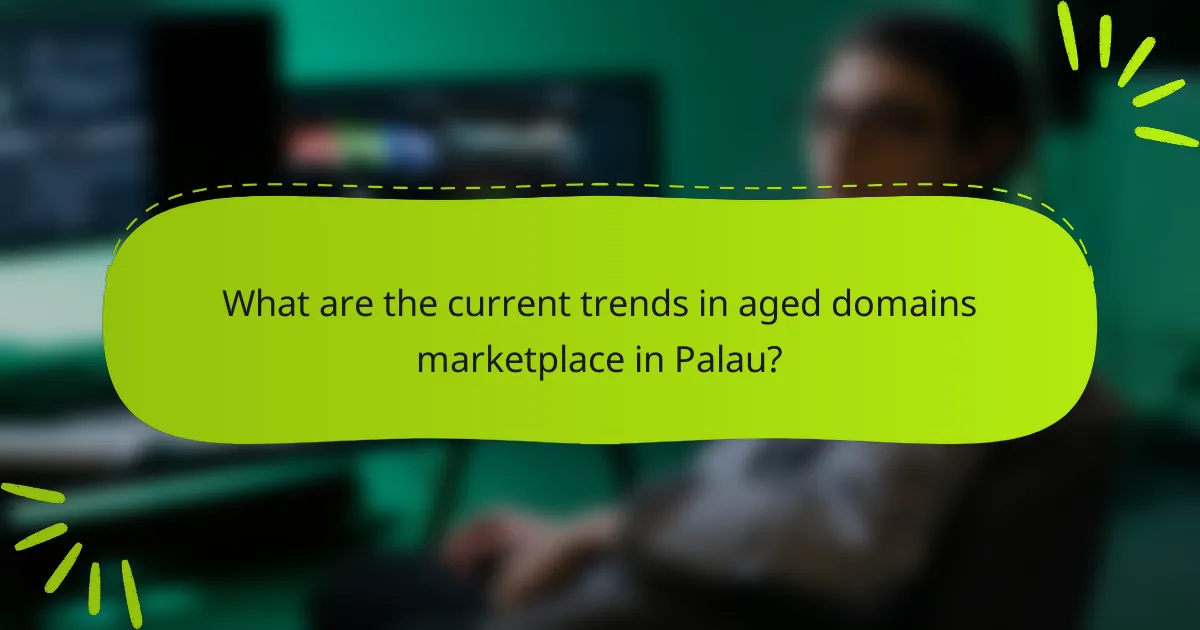The aged domains marketplace is experiencing significant growth as more investors and businesses recognize the advantages these domains offer for SEO and branding. By leveraging established authority and online visibility, aged domains can provide a competitive edge in the digital landscape.

What are the current trends in aged domains marketplace in Palau?
The aged domains marketplace in Palau is seeing notable trends driven by the increasing recognition of their value for SEO and branding. Investors and businesses are actively seeking aged domains to leverage their established authority and enhance online visibility.
Increased demand for SEO benefits
Many businesses in Palau are turning to aged domains to gain a competitive edge in search engine optimization (SEO). These domains often come with existing backlinks and traffic, which can significantly boost a website’s ranking on search engines. This trend is particularly appealing for local businesses aiming to attract more customers online.
When considering an aged domain for SEO, look for those with a clean backlink profile and relevant traffic. Avoid domains that have been penalized by search engines, as this can hinder your SEO efforts.
Growing interest in brandable domains
Brandable domains are becoming increasingly popular in Palau, as businesses recognize the importance of a strong online identity. Aged domains that are catchy and easy to remember can help companies establish their brand more effectively. This trend is particularly relevant for startups and entrepreneurs looking to make a mark in the digital space.
To choose a brandable domain, consider names that reflect your business values and are unique. Avoid overly complex or lengthy names, as these can be difficult for customers to recall.
Shift towards niche-specific aged domains
There is a noticeable shift towards acquiring niche-specific aged domains in Palau. Businesses are focusing on domains that align closely with their industry or target audience, which can enhance relevance and authority in specific markets. This trend allows companies to connect more effectively with their desired customer base.
When selecting a niche-specific aged domain, research the market to ensure that the domain resonates with your target audience. Look for domains that have previously been associated with similar businesses to maximize potential benefits.

How to evaluate aged domains for purchase?
Evaluating aged domains involves assessing various metrics that indicate their potential value. Key factors include domain authority, backlink profiles, and historical traffic data, which together provide insight into the domain’s past performance and future potential.
Check domain authority metrics
Domain authority (DA) is a score that predicts how well a domain will rank on search engines. Generally, a DA score ranges from 1 to 100, with higher scores indicating stronger potential. Look for domains with a DA of at least 20 for a reasonable starting point.
When checking DA, use tools like Moz or Ahrefs to ensure accuracy. A higher DA often correlates with better search engine visibility, but consider it alongside other metrics for a comprehensive evaluation.
Analyze backlink profiles
Backlink profiles reveal the quality and quantity of links pointing to the domain. A strong profile typically includes links from reputable sites, which can enhance the domain’s authority. Aim for a diverse range of backlinks, ideally from various domains.
Use tools such as SEMrush or Majestic to analyze the backlink profile. Look for red flags like a high number of spammy links, which can harm the domain’s reputation and SEO performance.
Assess historical traffic data
Historical traffic data indicates how much organic traffic the domain has received over time. Tools like Google Analytics or SEMrush can help you access this information. Look for consistent traffic patterns, as sudden spikes or drops may signal issues.
Consider domains with a history of stable traffic, as they are more likely to maintain their value. If available, compare traffic data against industry benchmarks to gauge performance effectively.

What are the benefits of investing in aged domains?
Investing in aged domains offers several advantages, including improved search engine rankings, an established online presence, and potential for higher resale value. These benefits can significantly enhance online visibility and credibility for businesses and individuals alike.
Improved search engine rankings
Aged domains often come with existing backlinks and authority, which can lead to better search engine rankings. Search engines tend to favor established domains over new ones, making it easier to achieve higher visibility in search results.
When considering an aged domain, check its backlink profile and domain authority using tools like Moz or Ahrefs. A strong backlink profile can boost your site’s SEO performance, potentially leading to increased organic traffic.
Established online presence
Investing in an aged domain provides an immediate online presence, as these domains typically have a history and may already be indexed by search engines. This can save time and effort compared to building a new domain from scratch.
Moreover, an established domain can enhance credibility with customers. For example, a domain that has been active for several years may instill more trust than a newly registered one, which can be crucial for e-commerce sites or service providers.
Potential for higher resale value
Aged domains can appreciate in value over time, especially if they have a strong backlink profile and a relevant niche. Investors often find that these domains can be resold at a premium, making them a potentially lucrative investment.
To maximize resale value, focus on domains that are short, memorable, and relevant to popular industries. Keeping an eye on market trends can also help identify which types of domains are in demand, allowing for strategic buying and selling.

What are the risks associated with aged domains?
Aged domains can present several risks that potential buyers should be aware of, including penalties from search engines, hidden negative SEO factors, and issues related to outdated content. Understanding these risks is crucial for making informed decisions when considering the purchase of an aged domain.
Possibility of penalties from search engines
One significant risk of acquiring an aged domain is the potential for penalties from search engines like Google. If the previous owner engaged in black-hat SEO practices or violated search engine guidelines, the domain may carry a penalty that can severely impact its ranking and visibility.
Before purchasing, conduct a thorough audit of the domain’s history using tools like Google Search Console or third-party services. Look for any manual actions or penalties that may have been imposed on the domain to avoid future complications.
Hidden negative SEO factors
Aged domains may harbor hidden negative SEO factors that can affect their performance. These can include toxic backlinks, spammy content, or associations with disreputable sites that could harm your site’s credibility.
To mitigate this risk, perform a comprehensive backlink analysis using tools like Ahrefs or SEMrush. Identify and disavow any harmful links that could lead to penalties or diminished search rankings.
Outdated content issues
Another risk associated with aged domains is outdated content that may not align with current trends or user expectations. This can lead to high bounce rates and low engagement if visitors find the content irrelevant or unhelpful.
To address this issue, review the existing content thoroughly and update it to reflect current information and best practices. Consider creating new, relevant content that adds value and engages your target audience effectively.

How to find reputable aged domain marketplaces?
To find reputable aged domain marketplaces, start by identifying well-known platforms that specialize in these domains. Look for established names in the industry that have a track record of reliability and customer satisfaction.
Research established platforms like GoDaddy Auctions
GoDaddy Auctions is a leading marketplace for buying and selling aged domains. It offers a wide selection of domains with varying age and authority, making it a good starting point. Other platforms worth considering include NameJet and Sedo, which also have strong reputations.
When researching these platforms, check their user interfaces, fees, and auction processes. Understanding how each platform operates can help you make informed decisions about where to invest.
Look for user reviews and testimonials
User reviews and testimonials provide insights into the experiences of previous buyers and sellers. Look for feedback on forums, social media, and review sites to gauge the reputation of a marketplace. Positive reviews often indicate a trustworthy platform.
Be cautious of marketplaces with numerous negative reviews or unresolved complaints. A few negative comments can be normal, but a pattern of dissatisfaction is a red flag.
Evaluate marketplace transparency
Transparency is crucial when selecting an aged domain marketplace. Reputable platforms should clearly outline their policies, fees, and the process for buying and selling domains. Look for detailed FAQs and customer support options.
Additionally, check if the marketplace provides information about the domains listed, such as their age, traffic statistics, and backlink profiles. This information helps you assess the value of the domains you are considering.

What criteria should be used for selecting aged domains?
When selecting aged domains, consider factors such as domain age, history, relevance to your target audience, and market demand for the niche. These criteria help ensure that the domain will effectively contribute to your online presence and SEO strategy.
Domain age and history
The age of a domain is a critical factor, as older domains often have established authority and trust with search engines. A domain that has been active for several years is generally more valuable than a newly registered one.
Additionally, the history of the domain matters. Check for past ownership, any penalties from search engines, or previous usage that could affect its current value. Tools like Wayback Machine can help you view a domain’s past content.
Relevance to target audience
Ensure the aged domain is relevant to your target audience and aligns with your business or content niche. A domain that reflects your industry or keywords can enhance your visibility and attract the right visitors.
Consider the existing backlinks and content associated with the domain. If the previous content was relevant, it may still hold value in terms of SEO and audience engagement.
Market demand for the niche
Assess the market demand for the niche related to the aged domain. A domain in a high-demand sector can provide better opportunities for traffic and monetization. Research trends and competition in your field to gauge potential success.
Utilize tools like Google Trends or keyword research platforms to identify interest levels and search volumes. This data can guide your decision on whether the domain is worth the investment.
